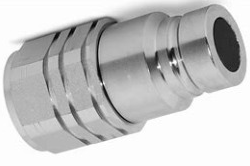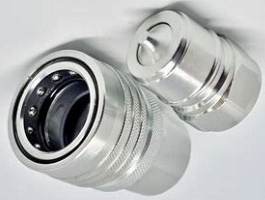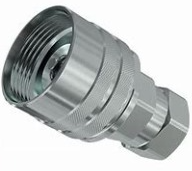Welcome to the world of hydraulic quick couplers. They are the silent heroes behind efficient machinery operations. In this exploration, we’ll uncover the essentials of these connectors. We’ll learn how they work and what factors guide their selection.
Choosing the right coupler is crucial. Whether you’re in construction, agriculture, or any industry relying on hydraulics. It improves efficiency and safety.
What Does a Hydraulic Quick Coupler Do?
In the realm of heavy machinery and hydraulic systems, a hydraulic quick coupler plays a pivotal role. It facilitates rapid, efficient connections. These devices serve as connectors. They enable swift changes of hydraulic attachments. No need for time-consuming manual interventions. They streamline operations, promoting seamless transitions between various tools and applications.
How Do I Identify a Hydraulic Coupler?
Identifying a hydraulic coupler involves recognizing its distinctive features. Look for the coupling mechanism, which can vary between types. Some couplers utilize a flat-face design. Others employ a poppet-style or a screw-to-connect mechanism. Additionally, consider the coupler’s size, pressure rating, and material composition. Ensure compatibility with your equipment.
Diversity of Hydraulic Quick Coupler Types
Breakdown of common types
Flat-face couplers:
Flat-face couplers have a leak-free design. They feature a flat mating surface. This minimizes fluid loss during connections and disconnections. This type is ideal for applications where cleanliness and environmental concerns are paramount.
Poppet-style couplers:
Poppet-style couplers use a valve with a popping action to control fluid flow. This design is robust and reliable, making it suitable for various heavy-duty applications.
Screw-to-connect couplers:
Screw-to-connect couplers use a threaded mechanism for quick and secure connections. This type is favored for its simplicity and ease of use, making it a versatile choice in many industries.
Specialized couplers for unique applications
High-pressure hydraulic quick couplers:
High-pressure couplers are engineered to handle elevated pressure levels. They are designed for demanding applications. Hydraulic systems operate under extreme conditions. They ensure reliable connections even in challenging environments.
Agricultural hydraulic quick couplers:
These couplers are tailored to the specific needs of the agricultural sector. They accommodate the requirements of farming equipment. They provide efficient and reliable connections for hydraulic attachments.
Factors Influencing Coupler Selection
Choosing the right hydraulic quick coupler involves a meticulous evaluation of various factors. It ensures optimal performance and longevity.
Compatibility with equipment
Consider the specifications of your machinery. Ensure that the coupler is compatible in terms of size, connection type, and overall design. A mismatch in compatibility can lead to inefficiencies and potential damage to both the coupler and the equipment.
Operating pressure and flow rate considerations
Different hydraulic systems operate at varying pressure levels and flow rates. Select a coupler that can withstand the specific pressure requirements of your system. Ensure it can efficiently manage the pressure. It’s equally crucial to understand the flow rate. This maintains seamless fluid transfer during operations.
Material and durability factors
The material composition of a hydraulic quick coupler directly impacts its durability and longevity. Choose couplers made from sturdy materials. These materials resist wear, corrosion, and damage from the environment. This ensures a longer lifespan and sustained reliability, even in demanding working conditions.
Benefits of Choosing the Right Hydraulic Quick Coupler
Selecting the appropriate hydraulic quick coupler goes beyond mere compatibility. It translates into tangible advantages. These benefits have a positive impact on operational efficiency. They also reduce downtime and improve overall safety within the work environment.
Increased efficiency in operations
The right hydraulic coupler streamlines operations by facilitating swift and hassle-free attachment changes. This efficiency increases productivity. Machinery can switch tasks without long interruptions.
Reduction of downtime
Downtime is a significant concern in any industry. A well-matched hydraulic coupler reduces downtime. It minimizes the time spent on manual coupler changes. This not only enhances productivity but also contributes to overall cost savings.
Enhanced safety features
Choosing a hydraulic quick coupler with safety features ensures a safer working environment. Look for leak prevention and secure locking mechanisms. These features not only protect equipment and operators but also contribute to the longevity of the hydraulic system.
Common Mistakes to Avoid
In the process of selecting hydraulic quick couplers, certain common mistakes can be detrimental to both operational efficiency and equipment longevity. Understanding these pitfalls is crucial to making informed decisions.
Choosing based on price alone
Choosing the cheapest coupler may seem cost-effective at first. However, it often leads to compromised quality and performance. Consider the long-term benefits. Invest in a coupler that aligns with your equipment’s requirements. Also, consider the demands of your operations.
Neglecting compatibility issues
Overlooking compatibility with equipment specifications can result in operational inefficiencies and potential damage. Ensure a thorough assessment of compatibility to avoid costly mistakes. Then, ensure smooth integration into your hydraulic system.
Overlooking maintenance requirements
Regular maintenance is key to the longevity of hydraulic couplers. Ignoring or neglecting routine maintenance practices can lead to premature wear, leaks, and failures. Stay proactive in maintaining your couplers to maximize their lifespan and performance.
Step-by-Step Guide to Choosing Hydraulic Quick Coupler Types
Navigating the myriad options of hydraulic quick couplers requires a systematic approach. Follow this step-by-step guide to make informed decisions tailored to your specific needs.
Assessing equipment specifications
Begin by thoroughly understanding the specifications of your machinery. Consider factors such as hydraulic system pressure, flow rate, and physical dimensions. This information forms the foundation for selecting a coupler. It seamlessly integrates with your equipment.
Identifying application requirements
Different applications demand different coupler characteristics. Identify the specific tasks your machinery will perform. Then, identify the corresponding hydraulic attachments needed. This ensures that the selected coupler type aligns with the demands of your operational environment.
Consulting with experts or manufacturers
Engage in conversations with industry experts or directly consult manufacturers. Their insights and expertise can provide valuable guidance. They can help you select the most suitable hydraulic quick coupler for your unique requirements. Take advantage of their knowledge to make well-informed decisions.
Choosing Hydraulic Quick Coupler Types for Specific Industries
Hydraulic systems have diverse applications in various industries. Each industry has its own set of requirements. Tailor your coupler choice to your industry’s needs for top performance and durability.
Construction and heavy machinery
The construction industry uses heavy machinery in demanding conditions. The choice of hydraulic quick couplers is critical. Consider robust designs that withstand heavy loads, harsh environments, and frequent attachment changes. Prioritize features such as durability, reliability, and efficient fluid transfer.
Agriculture and farming applications
Agricultural machinery requires hydraulic quick couplers. The couplers must cater to the unique demands of farming operations. Look for couplers that can handle the challenges posed by agricultural tasks. Agricultural tasks include exposure to soil, debris, and varying environmental conditions. Features such as easy cleaning are paramount. Leak prevention and compatibility with farming attachments are also important.
Conclusion
Choosing the right hydraulic quick coupler types is essential. It optimizes heavy machinery performance. It is a nuanced process. By understanding the functionality of hydraulic couplers, you can make informed decisions. Evaluate various types as well. Consider key factors to positively impact efficiency, safety, and overall productivity. Avoid common pitfalls to achieve this.
Carefully selecting hydraulic quick couplers contributes to smooth machinery operation. This applies to both construction and agriculture. It ultimately leads to the success of diverse industries.
Post time: Jan-26-2024




